On several occasions, I’ve shared horror stories of government brutality and asserted that all decent people should be libertarians.
If you still are not convinced, today we’re going to look at seven stories about so-called civil asset forfeiture, which is a sanitized term. Most people call it stealing.
Or “policing for profit.”
Let’s look at how this third-world scam operates, starting with a disgusting example of asset forfeiture from Reason.
Rustem Kazazi, an American citizen, was just trying to get on a plane to return to his native Albania last October, from Cleveland Hopkins International Airport. He was initially flying to Newark where he’d catch a connection to Albania. …Given facts about the Albanian banking and finance system and the advantages of cash there, he chose to turn his life savings into U.S. dollars and bring them with him to cover expenses related to the above house needs and his long stay rather than deal with bank transfers… Kazazi ran his carry-on luggage through the x-ray machine, like we all must. In that luggage was his life savings in cash, $58,100. There was zero attempt to be clandestine or smuggle-y about it. It was divided into three labeled and marked stacks of $100 bills, all in one envelope with $58,100 written on the outside.
…Given facts about the Albanian banking and finance system and the advantages of cash there, he chose to turn his life savings into U.S. dollars and bring them with him to cover expenses related to the above house needs and his long stay rather than deal with bank transfers… Kazazi ran his carry-on luggage through the x-ray machine, like we all must. In that luggage was his life savings in cash, $58,100. There was zero attempt to be clandestine or smuggle-y about it. It was divided into three labeled and marked stacks of $100 bills, all in one envelope with $58,100 written on the outside.
Here’s how despicable bureaucrats reacted.
TSA agents noticed the money. …They called Customs and Border Patrol (CBP) on Kazazi, who took him off to a private room to grill him, as well as strip him naked… They kept his money, without telling him why, then tried to get him to just get on his flight without it. The receipt they handed him made no reference to the specific amount they’d confiscated. When he refused initially to just go on with his day as if he hadn’t just suffered a horrible crime, they escorted him out of the airport. …In December CBP finally formally informed him via a “Notice of Seizure” that they’d taken $57,330 from him, $770 less than he insists was actually taken. The Kazazis filed all the officially required forms and notices to proceed with trying to get their money back… CBP agents tried to finagle the Kazazis into withdrawing their demand for federal court action, but failed.
The good news is that the invaluable Institute for Justice has intervened.
Kazazi and his family today filed a formal motion for return of property…with the assistance of consistent civil-forfeiture-justice fighters from the Institute for Justice… Let’s hope the courts do the right, and legal, thing, demand CBP obey the law and return the stolen money.
And here’s a nauseating example of theft-by-government from Texas.
For nearly a decade, Anthonia Nwaorie dreamed of starting a medical clinic in her hometown in Southern Nigeria. Last October, the 59-year-old nurse was boarding a plane in Houston with medical equipment,  supplies, and about $41,000 in cash — which had taken her years to save — when Customs and Border Protection officials stopped her. …Nwaorie said she was detained for hours. She missed her flight to Nigeria and the customs officers seized all her money. …CBP took the money because Nwaorie, a U.S. citizen since 1994 who lives in Katy, had not declared that she was taking more than $10,000 out of the country — a technical requirement that her lawyers say is not well-publicized…six months after her money was taken, Nwaorie has not been charged with a crime.
supplies, and about $41,000 in cash — which had taken her years to save — when Customs and Border Protection officials stopped her. …Nwaorie said she was detained for hours. She missed her flight to Nigeria and the customs officers seized all her money. …CBP took the money because Nwaorie, a U.S. citizen since 1994 who lives in Katy, had not declared that she was taking more than $10,000 out of the country — a technical requirement that her lawyers say is not well-publicized…six months after her money was taken, Nwaorie has not been charged with a crime.
Once again, the great people at IJ are involved.
Lawyers at the Institute for Justice, an Arlington, Virginia-based public interest law firm, say her case demonstrates just how abusive the practice of civil forfeiture — which allows the government to take property that is believed to be tied to a crime — can be. ….the Institute for Justice filed a class-action lawsuit against the agency on Nwaorie’s behalf, demanding that CBP return her money without forcing her to sign any written agreement. They’re also asking a federal court in Houston to void all such agreements that might have been signed by others trying to get seized property back.
George Will opined about another reprehensible example from Texas.
On Sept. 21, 2015, Serrano drove to the Eagle Pass, Tex., border crossing, intending to try to interest a Mexican cousin in expanding his solar panel installation business in the United States.  …they searched his truck — this was unusual for a vehicle leaving the country — and one agent said, “We got him!” …Having found five .380-caliber bullets in the truck’s center console — he has a concealed-carry permit but had no weapon with him — they handcuffed him and seized his truck under civil forfeiture, saying it had been used to transport “munitions of war.”
…they searched his truck — this was unusual for a vehicle leaving the country — and one agent said, “We got him!” …Having found five .380-caliber bullets in the truck’s center console — he has a concealed-carry permit but had no weapon with him — they handcuffed him and seized his truck under civil forfeiture, saying it had been used to transport “munitions of war.”
The heroes at IJ are on the case.
Assisted by litigators from the Institute for Justice (IJ), whose appearance on the West Texas horizon probably panicked the government into pretending to be law-abiding, Serrano wants to make the government less larcenous and more constitutional when it is enriching itself through civil forfeiture. …Serrano is suing for restitution but also seeking a class-action judgment on behalf of others who have been similarly mistreated. …Robert Everett Johnson is one of the IJ lawyers… Johnson says: “Imagine being detained at an airport checkpoint because you innocently forgot to take a tube of toothpaste out of your luggage. But rather than asking you to throw it out or put it in a plastic bag, the TSA agents told you they were seizing all of your luggage, including the toothpaste tube.” That happened to Serrano at the hands of a government — the one north of the border — that felt free to say, “You have no rights here.”
Here’s an example of this despicable practice from Wyoming.
Phil Parhamovich…had spent years restoring and selling houses, cars, and musical instruments, often clocking 12-hour workdays, to save up more than $91,000. And now it was all going to pay off: He would buy a music studio in Madison, Wisconsin… Then came the police stop… By the time it was over, police in Wyoming would take all of Parhamovich’s money — the full $91,800. Parhamovich, who has no criminal record, was not accused of or charged with a serious crime; he only got a $25 ticket for improperly wearing his seat belt and a warning for “lane use.” …state officials said they consider the cash “abandoned.” The state has even moved to forfeiture the money without notifying Parhamovich of the relevant court hearing until after it happened.
Then came the police stop… By the time it was over, police in Wyoming would take all of Parhamovich’s money — the full $91,800. Parhamovich, who has no criminal record, was not accused of or charged with a serious crime; he only got a $25 ticket for improperly wearing his seat belt and a warning for “lane use.” …state officials said they consider the cash “abandoned.” The state has even moved to forfeiture the money without notifying Parhamovich of the relevant court hearing until after it happened.
You won’t be surprised to learn who got involved to protect Parhamovich’s rights.
According to Parhamovich and his attorneys with the advocacy group, the Institute for Justice, this is another classic example of policing for profit and the problems it causes. Police initiated the stop for a minor traffic violation, but quickly escalated it further and further until they took a man’s life savings — all to use that money for their own law enforcement purposes.
This story has a happy ending (except for the fact that the cop isn’t in jail for stealing).
Wyoming lawmakers, citing this story, have now banned the roadside waivers that police used to wrongly take Phil Parhamovich’s $91,800. Previously, Parhamovich…got…his money back during a court hearing.
The IRS also participates in this thuggish racket, as reported by the Washington Post.
Oh Suk Kwon, who left South Korea for America in 1976, served as a fleet mechanic in the U.S. Army. After four years in the military, decades of working in an electrical plant and as an auto mechanic, after raising the kids  and seeing them off to their adult lives, Kwon finally bought a gas station in Ellicott City in 2007. It meant everything to him. Just a few years after he opened it, zealous government investigators…seized all of the station’s money on a hunch — and wiped the family out. No, they weren’t money launderers or terrorists or mobsters or tax evaders. The government found no evidence of criminal activity. …the gas station went under, and Kwon’s wife died amid the stress of it all…the agency won’t give Kwon his money back. …He’s heartbroken that the country he loves is treating him this way.
and seeing them off to their adult lives, Kwon finally bought a gas station in Ellicott City in 2007. It meant everything to him. Just a few years after he opened it, zealous government investigators…seized all of the station’s money on a hunch — and wiped the family out. No, they weren’t money launderers or terrorists or mobsters or tax evaders. The government found no evidence of criminal activity. …the gas station went under, and Kwon’s wife died amid the stress of it all…the agency won’t give Kwon his money back. …He’s heartbroken that the country he loves is treating him this way.
The story has additional examples.
…fervent investigations targeted scores of small businesses in Maryland. The best known of these was South Mountain Creamery… the creamery was accused of structuring — farmer Randy Sowers also said his bank teller told him to keep the deposits under $10,000 to cut paperwork — the farm’s entire operating budget was seized. …The government eventually found out that the cows weren’t drug mules and the chickens weren’t gangsters and allowed Sowers to sign a settlement agreement to get back half of about $60,000 that the IRS took. Sowers did it because he needed that money to keep the farm going. Another Maryland farmer, Calvin Taylor, had about $90,000 seized in 2011 after the government snagged him in a similar investigation. He couldn’t take the time to fight the charge, either, and agreed to a settlement where the government returned about $41,000.
Once again, the IJ people are fighting to protect people from rapacious government.
The farmers didn’t walk away from the fight. Backed by the libertarian Institute for Justice, Sowers, Taylor and others testified before Congress, petitioned and fought for three years to get their cash back.
The awful thugs at the IRS also stole money in Connecticut.
David Vocatura watched $68,000 disappear. He was at his family’s bakery in Norwich, Connecticut, when a squad of armed IRS agents filed into the store. The agents wanted to know if Vocatura and his brother Larry were trafficking drugs or running a prostitution ring. The brothers had no idea what they were talking about. …the IRS refused to believe Vocatura’s Bakery was operating on the up and up. Agents said the business raised red flags because of a series of cash deposits in sums under $10,000, the amount at which banks are required to report transactions to the federal government. …The agents had no evidence of other wrongdoing, but thanks to a controversial law enforcement tool known as civil asset forfeiture, they didn’t need any to seize every penny in the Vocaturas’ bank account… The IRS has…[been] subjecting David, 53, and his brother Larry, 69, to a series of increasingly aggressive legal maneuvers — including threats of significant prison time and additional fines — in an attempt to strong-arm them into permanently forfeiting their assets.
…the IRS refused to believe Vocatura’s Bakery was operating on the up and up. Agents said the business raised red flags because of a series of cash deposits in sums under $10,000, the amount at which banks are required to report transactions to the federal government. …The agents had no evidence of other wrongdoing, but thanks to a controversial law enforcement tool known as civil asset forfeiture, they didn’t need any to seize every penny in the Vocaturas’ bank account… The IRS has…[been] subjecting David, 53, and his brother Larry, 69, to a series of increasingly aggressive legal maneuvers — including threats of significant prison time and additional fines — in an attempt to strong-arm them into permanently forfeiting their assets.
Naturally, IJ is riding to the rescue.
…the Institute for Justice, a libertarian public interest law firm, filed a lawsuit in U.S. District Court for the District of Connecticut on behalf of Vocatura’s Bakery, demanding that the IRS promptly return their money. …Hours after the suit was filed, the IRS said it would finally give the Vocaturas their money back.
But the jackboots in government are vindictively going after the family.
Peter S. Jongbloed, assistant U.S. attorney for the District of Connecticut, served the Vocaturas a grand jury subpoena calling for them to turn over every financial record from the six years between March 2007 and April 2013, so the agency could finally begin investigating the business’s tax and regulatory compliance. …“At this point, the government is in so deep, they’ve put these guys through three years of hell — and held onto their money for three years — and so they feel like they need to justify it,” said Robert Everett Johnson, an attorney for the Institute for Justice who is representing the Vocaturas. “So now they’re going to conduct this investigation into the bakery in some effort to try to find something that will make it look like they were doing the right thing all along.”
Let’s review one final example of banana-republic law enforcement, this time from Alabama.
The morning of June 29, 2010, began much like any other at FAR Computers in Ensley. Frank Ranelli, who has owned the computer repair business for more than two decades, was doing some paperwork in his windowless office when he heard loud banging on the front door. When he answered it,  he was unaware that about 20 officers with the Homewood and Mountain Brook police departments were surrounding his store, some wearing flak jackets and carrying assault rifles. Within moments, a Homewood police sergeant had declared a room full of customers’ computers, merchandise and other items “stolen goods,” Ranelli recalled. …The police proceeded to confiscate more than 130 computers – most of which were customers’ units waiting to be repaired, though some were for sale – as well as the company’s business servers and workstations and even receipts and checkbooks. …Nothing ever came of the case. The single charge of receiving stolen goods was dismissed after Ranelli demonstrated that he had followed proper protocol in purchasing the sole laptop computer he was accused of receiving illegally. Yet none of the property seized by police that summer morning more than seven years ago has been returned to him.
he was unaware that about 20 officers with the Homewood and Mountain Brook police departments were surrounding his store, some wearing flak jackets and carrying assault rifles. Within moments, a Homewood police sergeant had declared a room full of customers’ computers, merchandise and other items “stolen goods,” Ranelli recalled. …The police proceeded to confiscate more than 130 computers – most of which were customers’ units waiting to be repaired, though some were for sale – as well as the company’s business servers and workstations and even receipts and checkbooks. …Nothing ever came of the case. The single charge of receiving stolen goods was dismissed after Ranelli demonstrated that he had followed proper protocol in purchasing the sole laptop computer he was accused of receiving illegally. Yet none of the property seized by police that summer morning more than seven years ago has been returned to him.
The article references the stellar work of IJ.
Alabama’s laws, however, still provide the state’s citizens with few protections from the practices, earning the state a “D- for its civil asset forfeiture laws” in a November 2015 report by the Institute for Justice, a Virginia nonprofit advocacy law firm. Alabama laws stack the deck against victims of asset forfeiture by establishing a “low bar to forfeit” and not requiring a conviction to do so; offering “limited protections for innocent third-party property owners”; and letting “100% of forfeiture proceeds go to law enforcement,” the report stated. …In a time of increasingly tight budgets for many law enforcement agencies, seizing property offers an opportunity for them to increase revenue without politicians having to raise taxes.
The good news (relatively speaking) is that some states are trying to curtail this evil practice.
The bad news is that cops in some states have figured out how to steal regardless.
In theory, New Hampshire has reformed its asset forfeiture laws. The state passed a bill in June 2016 to keep police from seizing and keeping people’s property unless those people have been convicted of a crime.  And yet New Hampshire Public Radio reports this week that the state’s cops are still trying to keep stuff seized from people who have been accused but not actually convicting of criminal behavior. …when the reforms were passed…there was a big loophole. The U.S. Justice Department’s “Equitable Sharing” program allows local law enforcement agencies to partner with the feds for busts, then funnel the forfeiture through the looser federal program, which doesn’t require convictions, back into the local police budgets. Doing this allows them to skirt any state-level restrictions on asset forfeiture.
And yet New Hampshire Public Radio reports this week that the state’s cops are still trying to keep stuff seized from people who have been accused but not actually convicting of criminal behavior. …when the reforms were passed…there was a big loophole. The U.S. Justice Department’s “Equitable Sharing” program allows local law enforcement agencies to partner with the feds for busts, then funnel the forfeiture through the looser federal program, which doesn’t require convictions, back into the local police budgets. Doing this allows them to skirt any state-level restrictions on asset forfeiture.
In other states, the establishment is going nuts trying to preserve their shady scam.
…a local prosecutor and police officer say the state will be welcoming violent drug cartels if a Republican lawmaker gets his way. State Sen. Kyle Loveless has been trying to muster support this year for a bill that would reform a controversial law enforcement tool known as civil asset forfeiture. …Loveless sees this as a fundamental violation of people’s rights to due process and property and says the lax standards have gotten innocent people in Oklahoma caught in the civil asset forfeiture net. On Thursday, he sparred with Tulsa County District Attorney Steve Kunzweiler and Eric Dalgleish, a major at the Tulsa Police Department, over the merits of his bill to require a criminal conviction to permanently take someone’s property. …Kunzweiler, the district attorney, said the extra level of protection was unnecessary and that raising the bar for forfeiture would effectively roll out a welcome mat to ruthless drug traffickers from Mexico. …Dalgleish later said that cartels were keeping a close eye on Loveless’ legislation and even lobbying for its passage.
…Loveless sees this as a fundamental violation of people’s rights to due process and property and says the lax standards have gotten innocent people in Oklahoma caught in the civil asset forfeiture net. On Thursday, he sparred with Tulsa County District Attorney Steve Kunzweiler and Eric Dalgleish, a major at the Tulsa Police Department, over the merits of his bill to require a criminal conviction to permanently take someone’s property. …Kunzweiler, the district attorney, said the extra level of protection was unnecessary and that raising the bar for forfeiture would effectively roll out a welcome mat to ruthless drug traffickers from Mexico. …Dalgleish later said that cartels were keeping a close eye on Loveless’ legislation and even lobbying for its passage.
Shame on Kunzweiler and Dagleish. What reckless and dishonest demagoguery.
And three cheers for Sen. Loveless, who deserves a lot of love for putting the principles of the Constitution first.
Sadly, the Trump Administration is on the side of theft-by-government, which is especially disappointing since there was a small move in the right direction during the Obama years.
P.S. Just like intrusive and ineffective money-laundering laws, wretched asset forfeiture laws are largely the result of the foolish War on Drugs. One bad policy generates another bad policy. Lather, rinse, repeat.
Read Full Post »
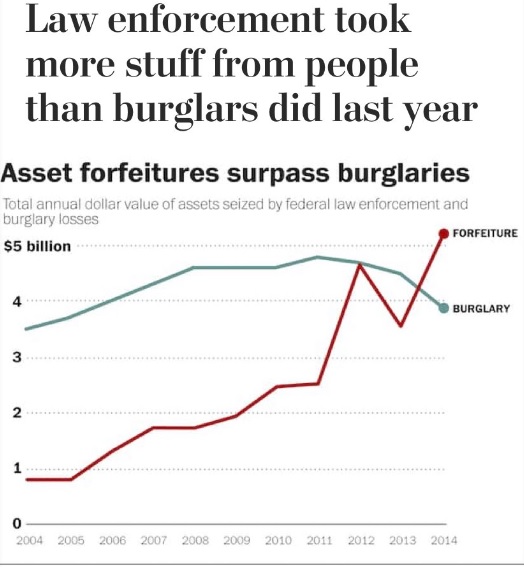 Death tax – The IRS penalizing saving and investment by grabbing money just because someone dies.
Death tax – The IRS penalizing saving and investment by grabbing money just because someone dies.She neglected to pay taxes on her one-bedroom condominium, and by 2015 the $2,300 due in back taxes — combined with penalties, interest and fees — brought her liability to $15,000. The county seized and sold her property for $40,000. Tyler is not challenging the propriety of the seizure or sale, but of the county’s home equity theft. Instead of returning $25,000 to her, the government, in a common act of legalized self-dealing, kept $25,000… Such predatory forfeiture is done by a dozen states and the District of Columbia, which took a $200,000 home from a man with dementia and a $133 tax debt.
…Multiple federal courts ruled against Tyler, who is now 94 years old, prior to her case’s ascension to the Supreme Court… Christina M. Martin, a senior attorney at the Pacific Legal Foundation…said…”the county should have taken the property, sold it, paid the debts from the proceeds, and refunded the remainder to Ms. Tyler. Instead, the county took everything.” It’s a line of thinking the Court appeared receptive to.



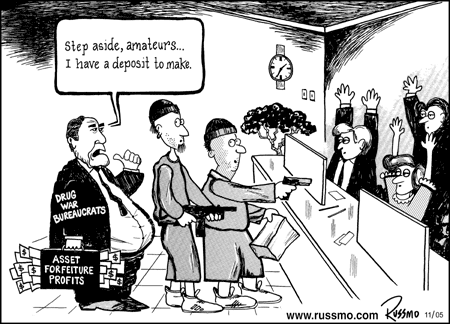
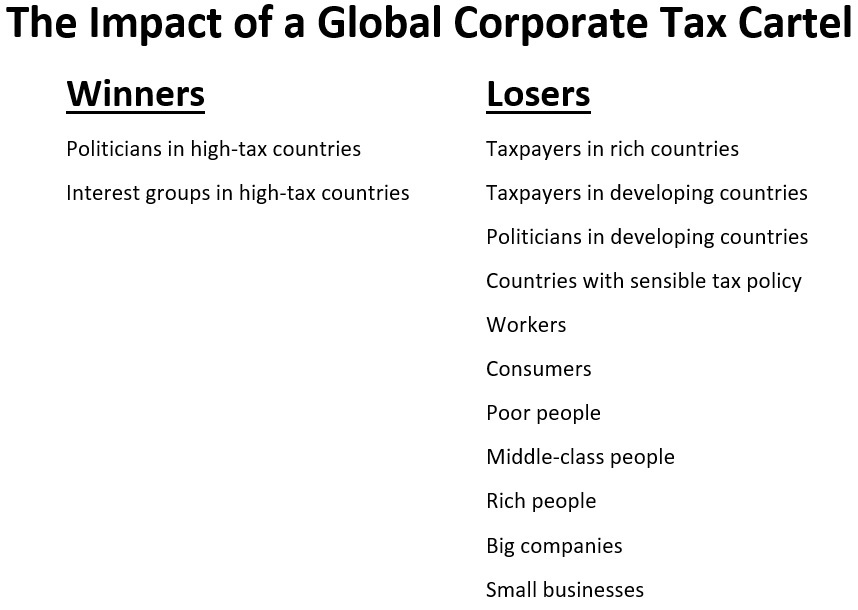
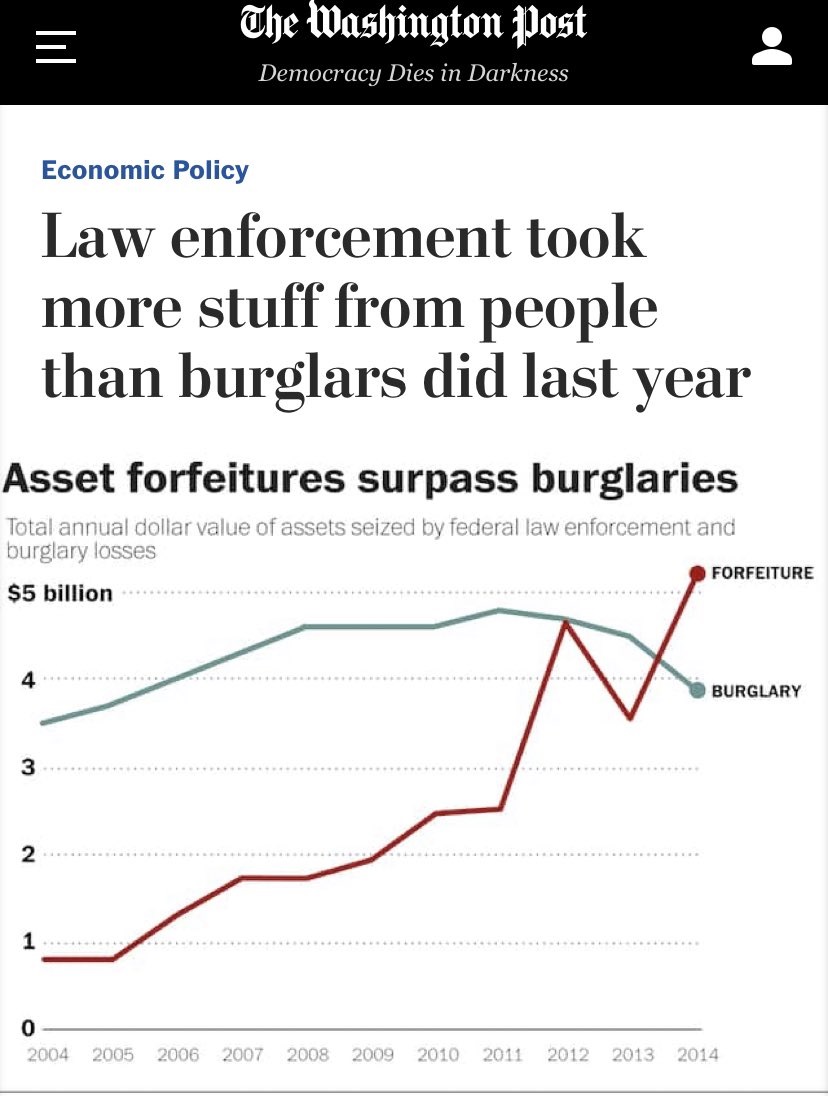
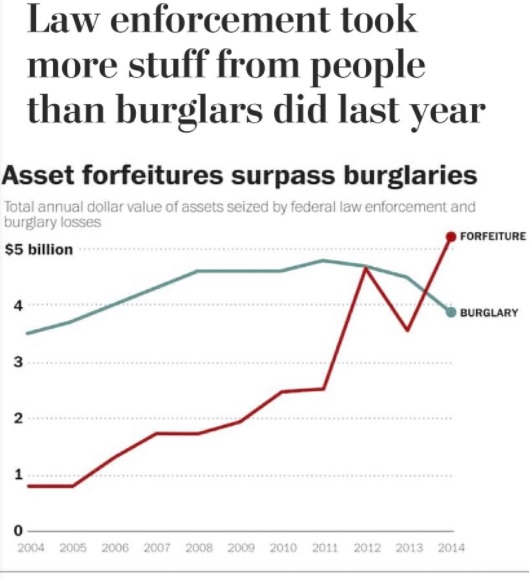






















/cdn0.vox-cdn.com/uploads/chorus_asset/file/3794308/forfeiture%20percent.png)















